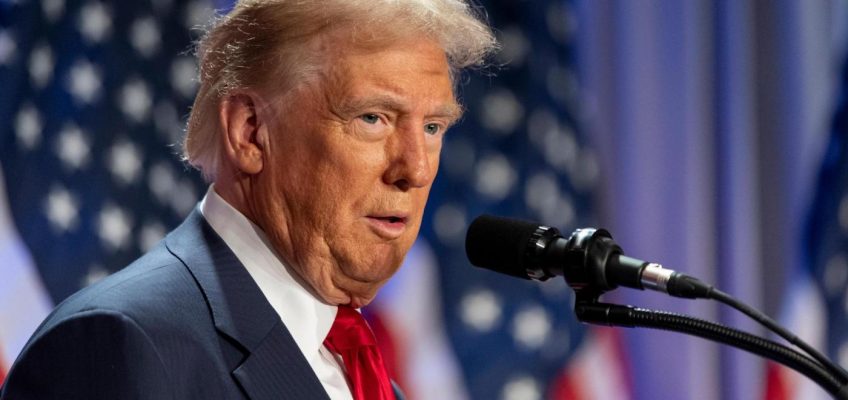Now that Donald Trump will be headed to the White House, it is all but certain that he will pursue significant new taxes on imported goods. Although a widely criticized policy, there is little stopping him from doing this due to trade powers that Congress has given the executive branch over the years. Before President Joe Biden leaves office, his administration and the current Congress should consider scaling back the president’s power to unilaterally enact tariffs. This restraint would protect households from large tax increases, prevent economic harm and ease relations with our major trading partners.
President-elect Trump has promised to enact significant new tariffs on imports. Last week he stated that on his first day in office he would impose 25% tariffs on all imported goods from Mexico and Canada, as well as import taxes on Chinese goods as high as 60%. Others are likely to follow. Trump could also pursue more targeted tariffs on certain goods in the same way he did during his first administration.
Contrary to what Trump and many of his supporters claim, these taxes would end up placing a significant burden on American households. Just a 10% across-the-board tariff plus a 60% tariff on Chinese imports could raise more than $2.8 trillion over a decade for an average tax increase of $1,820 per household, according to estimates from the Tax Policy Center.
Although these tariffs would have significant implications for the federal budget and household finances, there is little to stop Trump from unilaterally enacting these taxes under current law. Generally, the Constitution states that Congress has the authority to “lay and collect” taxes and regulate commerce with foreign nations. However, Congress outsourced much of the power to enact tariffs to the executive branch throughout the 20th century. As a result, the president now has broad authority to levy taxes on imported goods. In many cases, the administration only needs to determine there is a national emergency or a national security threat.
These unilateral tariff powers were used to great effect in the past by Trump and other presidents. During Trump’s first term he enacted tariffs on steel from most countries by claiming this served national security. Biden utilized powers from the Trade Act of 1974 to increase tariffs on Chinese imports. Decades earlier, President Nixon used existing authority to impose a 10% tariff on all imported goods coming into the United States.
The current Congress and Biden should step in and enact legislation that ensures that Trump is unable to impose such significant trade measures without congressional approval. They could do this much the same way Congress stepped in to block tariffs proposed by President Carter in 1980.
Scaling back these powers would have benefits besides protecting Americans from tax increases.
First, shifting the power to lay and collect tariffs back to Congress would mean that major tariff proposals are properly debated. Congress is currently required to debate and pass legislation to make even small changes to income or payroll taxes. This should be true for tariffs as well, especially proposals that involve trillions in additional federal revenue. Trump should have to convince Congress that enacting across-the-board tariffs would be consistent with his geopolitical goals and would be worth the economic costs.
Related Articles
William Cooper: ‘Shut up’ doesn’t light the way
Stephen L. Carter: It’s time to change the way we elect the president
David French: Kash Patel’s threat to the rule of law
Bret Stephens: A disgraceful pardon
Karin Klein: Trump has a chance to become a true education president
Second, handing the reins back to Congress would reduce market uncertainty. Simply the risk of tariffs can have a negative effect on the economy. Businesses that expect tariffs may be less likely to pursue investments that may be subject to taxation at some point in the future. Shifting tariff power back to Congress means that proposals to raise and repeal tariffs would be more predictable.
Third, it would help improve relations between the U.S. and its trading partners. Trump’s approach to trade policy has proved to worsen relationships between the United States and its most important trade partners. Even prior to Trump’s election, the European Union had already announced that it would hit back at the United States if Trump enacted tariffs on EU products. Trade wars with our allies run counter to Trump’s goal of countering geopolitical foes such as China and magnify the economic damage of Trump’s tariff policies.
Although legislation limiting the president’s tariff power could prevent Trump from unilaterally enacting tariffs, it may not prevent them entirely. Reports suggest that the Trump administration and Rep. Jason Smith, R-Mo., the chairman of the House Ways and Means Committee, are discussing ways in which to incorporate tariffs into next year’s tax bill. This would be a mistake, but at the very least it would be debated before being enacted.
While there are few tax issues that the Democratic Senate, Republican House and Biden agree on, they should be able to unite behind preventing significant, unlegislated tax increases on American households.
Kyle Pomerleau is a senior fellow at the American Enterprise Institute, where he studies federal tax policy. He wrote this column for the Los Angeles Times.


Leave a Reply